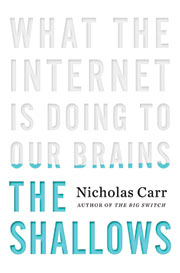(W.W. Norton & Company, 276 pages, $26.95)
By Nicholas Carr
 Every so often an invention or innovation completely reorders our perception of reality and ushers in a new age of expanded consciousness and often-greater convenience. We bless each newcomer's arrival, and thank it for ending our dependence on its soon to be obsolete predecessor. Certainly this is how we think of the miracle that is the Internet which, as Nicholas Carr says, "apart from alphabets and number systems, may be the single most powerful, mind-altering technology that has ever come into general use."
Every so often an invention or innovation completely reorders our perception of reality and ushers in a new age of expanded consciousness and often-greater convenience. We bless each newcomer's arrival, and thank it for ending our dependence on its soon to be obsolete predecessor. Certainly this is how we think of the miracle that is the Internet which, as Nicholas Carr says, "apart from alphabets and number systems, may be the single most powerful, mind-altering technology that has ever come into general use."
Where we once lived in the "linear, hierarchical," book-based world of words and paragraphs, pages and chapters, we now dwell in the Web's "world of ubiquitous connectivity and pervasive proximity." Here, the formerly close relationship between lone writer and lone reader fostered by book-reading, which encouraged a commitment of time and engagement from both, is perpetually undermined by the "distractedness" of the Internet experience. The Internet, with all the red herrings and diversionary paths suddenly available through hyperlinks and instant searches, breeds, according to Carr, an atomized attention span, and a general tendency toward glibness and brevity over complexity and nuance.
Just as it has transformed our ways of doing business, of communicating with one another, and entertaining ourselves, the Internet, says Carr, by reference to countless neuroscientific studies, is also changing our brains, and not necessarily for the better. As he demonstrates, when the brain acquires a new skill, it alters its own makeup to absorb it. At the same time, the brain slowly forgets the skills no longer in use.
Books, and even movies, with their unidirectional stories, closed narrative systems, and lack of interactivity, can seem deeply inflexible and old-fashioned in a world where video games can be played with a hundred strangers, with alterable outcomes and no fixed narrative, in which participants become co-authors of their own experiences. Like it or not, Carr says, this is the world we live in. Filmmakers, along with everyone else, will no doubt have to make adjustments.
Review written by John Patterson.